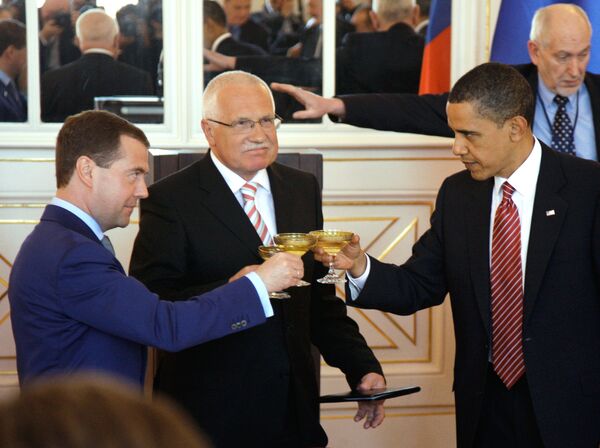The new strategic arms reduction treaty is beneficial for both Russia and the United States, a Russian military analyst said on Thursday.
The new treaty, signed by presidents Dmitry Medvedev and Barack Obama in Prague on Thursday, is expected to bring Moscow and Washington to a new level of cooperation in the areas of nuclear disarmament and arms control.
"It is a compromise agreement in which Russia and the United States moved as close to each other in their positions as Moscow and Washington considered reasonable," said Igor Korotchenko, editor-in-chief of the National Defense magazine.
The new strategic arms pact stipulates that the number of nuclear warheads is to be reduced to 1,550 on each side over seven years, while the number of deployed and non-deployed delivery vehicles must not exceed 800.
Overall, the new deal slashes the number of warheads by 30% and the number of delivery vehicles by half from 2002 levels.
The Strategic Offensive Reductions Treaty (SORT), better known as the Moscow Treaty, which was signed in 2002, provided for a ceiling of 1,700-2,200 nuclear warheads on each side.
Korotchenko said both countries had a reason to agree to these comprehensive cuts.
"Russia benefits from the deal because it will be able to decommission Soviet-era liquid-fuel heavy ICBMs whose service life has expired," the analyst said.
The low reduction ceilings also meet Russia's interests because the production of new solid-fuel Topol-M and RS-24 ICBMs has been slow and the development of the ill-fated Bulava SLBM is still in question.
"The United States is revising the role and the place of nuclear weapons in its national security strategy and emphasizing high-precision weaponry, which allows the U.S. military accomplish practically the whole range of tasks," Korotchenko said.
The analyst added that U.S. missile defense plans in Europe remained the major irritant in Russian-U.S. relations.
"It is obvious that the sides will not be able to reach a compromise on this issue in the next five to seven years and Russia will be either forced to find an adequate, but less costly response or it will have to agree on joining the global missile defense network controlled by the United States and NATO," he said.
Both presidents pledged at the signing ceremony in Prague to continue dialogue on missile defense to remove the disagreements that remain between Moscow and Washington over U.S. plans.
Medvedev proposed cooperation with the United States in creating a global missile defense network.
MOSCOW, April 8 (RIA Novosti)




